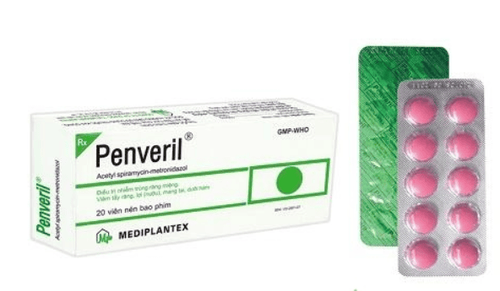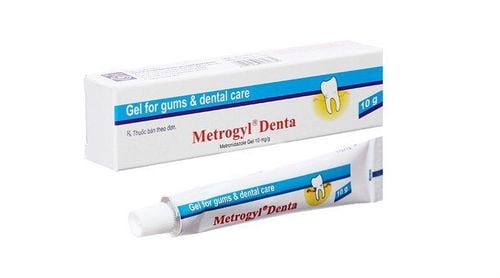This is an automatically translated article.
Bleeding when brushing teeth is a phenomenon that everyone has encountered. However, if this condition persists for a long time, you need to pay special attention, because this could be a sign of one of the health problems that need to be treated.
1. What is bleeding when brushing teeth?
Bleeding gums when brushing teeth is an abnormal condition in the gums, which can be caused by trauma or gum disease. Healthy gums are usually pink in color, firm, do not bleed easily even if you accidentally brush your teeth, and gums are a bit stronger than usual.
So, when the gum condition is bleeding naturally or with very light force, like brushing with a soft brush, flossing properly, it is definitely a manifestation of gum disease or distant rather than disease of the tissue around the teeth (periodontitis).

Chảy máu khi đánh răng do nhiều nguyên nhân gây ra
Most people who naturally bleed when brushing their teeth will often think that they are deficient in vitamin C and arbitrarily supplement. However, if you want to treat bleeding gums when brushing your teeth, you need to determine the right cause for treatment, because vitamin C deficiency is just one of the uncommon causes.
2. Causes of tooth brushing or bleeding 2.1. Gingivitis causes bleeding when brushing Most people get gingivitis because plaque stays on the gum line for a long time. Plaque is understood as debris and bacteria that stick to your teeth.
Brushing is a way to quickly remove plaque and can prevent tooth decay. However, plaque can remain above the gum line if you don't brush and floss properly.
If plaque is not removed for a long time, it can harden into tartar (calcium), increasing the risk of bleeding when brushing. The accumulation of plaque near your gums can also be the cause of gingivitis.
The typical signs of gingivitis include:
Swollen gums; Soreness in the oral cavity and gum areas; Bleeding tooth . 2.2. Bleeding gums from periodontitis Periodontitis (periodontitis) is an oral disease that occurs when the inflammation of the gums becomes more severe. Periodontal disease is an infection of your gums, jawbone, and the supporting tissues that connect your teeth and gums. Periodontitis can cause teeth to loosen or fall out and this can be the cause of bleeding gums when brushing teeth in the morning.
2.3. Diseases of the teeth When teeth are decayed, especially in the interdental spaces, food is deposited in the deep holes causing gingivitis in the interdental spaces. Infections at the roots of the teeth that cause swollen gums also cause bleeding gums when brushing teeth. On the other hand, when your teeth are in pain or there is a feeling of sensitivity and discomfort, you tend to avoid chewing on the side of the tooth that is in pain, this makes tartar easier to stick, causing other oral diseases. such as gingivitis and bleeding gums.

Chảy máu khi đánh răng có thể do áp xe răng
2.4. Tooth Abscess A tooth abscess is an infection and bacteria that get deep inside your teeth. When you have a tooth abscess, you will feel constant pain, brush your teeth or have bleeding, fever and facial swelling. If it turns to the swelling stage of the face, it means that this disease has developed seriously.
2.5. Hormonal changes in women Hormonal changes often appear during a woman's life stages, from puberty to pregnancy or menopause and also when using oral contraceptives. Hormonal changes are a fairly common problem that increases the risk of bleeding gums.
For many people, bleeding gums when brushing teeth is also an early sign of pregnancy. In addition to the direct cause of disease and poor oral hygiene, some changes during pregnancy make bleeding worse. At the same time, during this period, more progesterone is produced, which increases blood flow to the gums, sensitive and stimulating, causing bleeding gums.
2.6. Poor nutrition Some ingredients in the processed foods you eat every day can irritate your gums and cause frequent bleeding when brushing your teeth. So you need healthier alternatives. The cause of bleeding gums when brushing teeth from food is largely due to a lack of vitamin C and vitamin K, which are essential vitamins for blood clotting.
You should add more green vegetables, fruits and vegetables to the menu. In particular, you also need to add calcium, vitamins C and K, and magnesium to promote health.
2.7. Use of certain drugs in the treatment of diseases Using medicines for treatment causes bleeding gums when brushing teeth is quite common in people with chronic diseases that must be treated with maintenance drugs. Some medications used to treat heart conditions, such as heart attacks or strokes, or chemotherapy drugs used to treat cancer, can also cause bleeding gums.
2.7. Hard toothbrush Many people believe that bleeding when brushing teeth is caused by a brush that is too hard. If you are using a coarse toothbrush, change it to a softer one. Prioritize choosing to buy and use brushes with soft bristles, which bring a gentle, soothing feeling when brushing.
You also note that if you brush your teeth too hard, it will also easily damage your gums and cause frequent bleeding gums when brushing your teeth, so try to change this bad habit.
3. Prevent bleeding when brushing teeth 3.1. Proper oral hygiene This is the first step to controlling bleeding when brushing. You need to remember to brush your teeth twice a day at bedtime and when you first wake up. You need to pay attention to brushing your teeth with the correct technique, brushing along the position of the roots from the top down and from the bottom up or in a circular motion.
Should use soft toothbrushes and do not brush too hard to scratch or damage the gum mucosa leading to bleeding when brushing.
3.2. Regular dental check-ups You should visit your dentist twice a year for regular check-ups and oral hygiene. Your dentist will let you know if you are experiencing gingivitis and teach you how to properly brush your teeth. Proper brushing and flossing can remove plaque above the gum line, reducing the risk of developing periodontal disease and bleeding when brushing.
Your dentist can also teach you how to use antiseptic mouthwashes to minimize the appearance of plaque that forms in the mouth. Gargling with warm salt water is a simple and economical way to help soothe swollen gums that bleed easily.

Nên đến gặp nha sĩ 2 lần mỗi năm để khám định kỳ
3.3. Supplementing with necessary micronutrients You should supplement with vitamins C and K necessary for oral health. Vitamin C works to speed up the wound healing process and vitamin K plays a role in limiting the risk of bleeding when brushing. You can get vitamin C from familiar fruits like oranges, grapefruits, lemons and vitamin K when eating bananas or radishes.
Calcium, magnesium and the anti-inflammatory substances found in fish oil are also beneficial for oral health. You should eat a lot of green vegetables because the fiber in vegetables can have the same role in removing plaque on the teeth and gum surface as when brushing your teeth.
3.4. Use a soft toothbrush Using a toothbrush with soft filaments is a way to create a more comfortable feeling for your teeth and gums, especially in case you often have bleeding gums when brushing your teeth. Toothbrush bristles that are too hard can cause enamel wear.
You can also consider replacing electric toothbrushes. The brush head is specially designed to help you clean the gum line more easily than other regular toothbrushes.
In summary, bleeding gums when brushing teeth is a very common injury. Most people are subjective but this is a warning sign of some dental disease that needs to be treated early. So, follow the above methods to prevent bleeding when brushing your teeth, protect your oral health.
Please dial HOTLINE for more information or register for an appointment HERE. Download MyVinmec app to make appointments faster and to manage your bookings easily.













